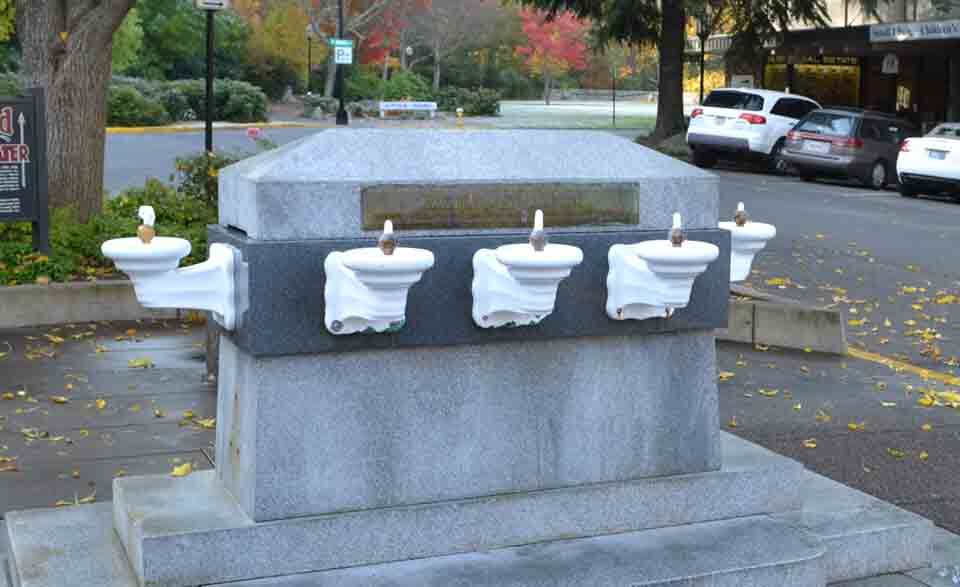Ashland’s Historic Lithia Water Fountain Could Face Permanent Shut Off

ASHLAND, Ore. — The renowned lithia water fountains in Ashland’s downtown plaza were closed more than a month ago. Ashland might find itself permanently losing access to this source of natural mineral water.
Ashland is synonymous with its lithia water, even though it has an unpleasant smell. Resident Deirdre Barber remarked Wednesday in downtown Ashland, “It tastes similar to rotten eggs.”
The eight ceramic bubblers encircling a stone podium were installed in 1927, when lithia water was first promoted as a health tonic. These days, it is used mainly to attract unsuspecting tourists. There is an old metal sign that says, “Natural Lithia Water.” Above it now is a duct-taped sign that says “Out of Order.”
The Oregon Health Authority now says that the lithia drinking fountains must adhere to the same regulations as other drinking water sources in order to make them accessible.
Speaking on behalf of the OHA, Jonathan Modie stated that during a meeting with the city in late October, the agency discovered that the water has high levels of contaminants, such as barium, sodium, and boron. This was far above the levels advised by the state’s health advisory.
Modie said, “The goal of Drinking Water Services is to ensure that the drinking water from any source is safe and healthy for any community.”
Until now, OHA has overlooked the fountain issue.
Michael Morrison, an Ashland Public Works department official, said,
“They told us in 2016 that they do not consider it a public water source. However, they said recently that that might change.”
By the time the story was published, Modie was unavailable to explain why OHA had suddenly changed its mind. Morrison speculated that perhaps OHA’s new staff is interpreting the rules differently.
Morrison suggested that one way of solving the problem is to install a treatment system to remove pollutants. “However, as soon as we begin treatment, the historic water will disappear,” he declared. “It will eliminate the ingredients that have medicinal qualities.”
Morrison continued, “The expense of setting up and maintaining a treatment system would be exorbitant. The city might as well just connect the fountains to the main water supply.”
Altering the source of the water supply or forbidding individuals from using the fountains altogether are further options. The fountains came about when, in 1927, the city was unsuccessful in using the water to set up a health spa. Ashland’s drinking water, which is pumped into downtown from a well located past the airport, is not the same as the lithia water.
The city has been closely associated with the lithia water. Numerous locations bear the name of the water, such as Lithia Park and Lithia Motors. The Ashland Springs Hotel, built in 1925, was formerly known as the Lithia Springs Hotel.
The City of Ashland is hoping that OHA will provide a solution that would allow the lithia water to continue flowing in its current form. According to Morrison, research may be necessary to determine what would satisfy the state requirements. OHA and the city are currently in discussions to find a solution.
Morrison stated, “Ideally, we would like to see the water exactly as it was. However, things have evolved over time, and the quality of drinking water is very important.”
